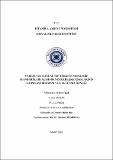DSpace Repository
VERGİ USUL KANUNU İLE TÜRKİYE MUHASEBE STANDARTLARI AÇISINDAN DEĞERLEME ESASLARININ KARŞILAŞTIRILMASI VE UYGULAMA ÖRNEĞİ
JavaScript is disabled for your browser. Some features of this site may not work without it.
| dc.contributor.author | Sansar, Yunus
|
|
| dc.date.accessioned | 2019-12-02T07:23:36Z | |
| dc.date.available | 2019-12-02T07:23:36Z | |
| dc.date.issued | 2015 | |
| dc.identifier.uri | http://hdl.handle.net/11547/5202 | |
| dc.description.abstract | Bilindiği üzere 6102 sayılı Türk Ticaret Kanunu’nun 64 ve 88’inci madde hükümlerine tabi gerçek ve tüzel kişiler gerek ticari defterlerini tutarken, gerek münferit ve konsolide finansal tablolarını düzenlerken Türkiye Muhasebe Standartlarına Türkiye Finansal Raporlama Standartlarına ve kavramsal çerçevede yer alan muhasebe ilkelerine ve bunların ayrılmaz parçası olan yorumlara aynen uymak ve bunları uygulamak zorundadırlar. Bu kapsamda her tacir, ticari defterleri tutmak ve defterlerinde, ticari işlemleriyle malvarlığı durumunu, Türkiye Muhasebe Standartlarına ve Türk Ticaret Kanunu’nun 88’inci madde hükümlerine göre açıkça görülebilir bir şekilde ortaya koymak zorundadır. Defterler, üçüncü kişi uzmanlara, makul bir süre içinde yapacakları incelemede işletmenin faaliyetleri ve finansal durumu hakkında fikir verebilecek şekilde tutulur. İşletme faaliyetlerinin oluşumu ve gelişimi defterlerden izlenebilmelidir. Bu çalışmada Türkiye Muhasebe Standartları (TMS) ve Vergi Usul Kanunu değerleme yaklaşımı ile ele alınmıştır. VUK değerleme hükümleri bilanço kalemlerinin bütününü aktif ve pasifiyle değerlemeye tabi tutan ve sistematiğe dayanan bir yaklaşımdır. Bu çerçevede VUK ve TMS değerleme genel esasları ve değerleme ölçüleri ele alınmış ve açıklanmıştır. Çalışmanın izleyen bölümlerinde Maddi duran varlıklar, maddi olmayan duran varlıklar, stoklar, menkul kıymetler, iştirakler, alacaklar ve borçlar, kasa ve finansal kiralamaların değerlemesi ve muhasebe işlemleri örnek uygulamalar ve muhasebe kayıtları ile anlatılmıştır. | tr_TR |
| dc.language.iso | tr | tr_TR |
| dc.publisher | İSTANBUL AYDIN ÜNİVERSİTESİ SOSYAL BİLİMLER ENSTİTÜSÜ | tr_TR |
| dc.subject | Vergi Usul Kanun | tr_TR |
| dc.subject | Türk Ticaret Kanunu | tr_TR |
| dc.subject | Türkiye Muhasebe Standartları | tr_TR |
| dc.subject | Tax Procedural Law | tr_TR |
| dc.subject | Turkish Commercial Code | tr_TR |
| dc.subject | Turkish Accounting Standards | tr_TR |
| dc.title | VERGİ USUL KANUNU İLE TÜRKİYE MUHASEBE STANDARTLARI AÇISINDAN DEĞERLEME ESASLARININ KARŞILAŞTIRILMASI VE UYGULAMA ÖRNEĞİ | tr_TR |
| dc.type | Thesis | tr_TR |
| dc.description.abstractol | As is known, real persons and corporate entities subject to Art. 64 and 88 of Turkish Commercial Code, have to satisfy and implement the “Turkish Financial Reporting Standards”, the accounting principles stated in “Conceptual Framework” and the comments that are integral part of those when keeping commercial books and preparing solo and consolidated financial statements. In this context, all the tradesmen have to keep commercial books and show truly the commercial transactions and the assets in the commercial books in accordance with “Turkish Accounting Standards” and the provisions of Art. 88 of Turkish Commercial Code. All the books have to be kept in a way that they must give an idea about the operating activities and financial position to third party specialists who make examinations in limited time periods. Occurrence and development of the operating activities should be able to be followed via commercial books. In this study, valuation approaches of both Turkish Accounting Standards and Turkish Tax Procedural Law are discussed. Provisions regarding valuation in Tax Procedural Law have a systematic approach that subjects all the balance sheet items including assets and liabilities to valuation. General principles and measures of valuation in Tax Procedural Law and Turkish Accounting Standards are discussed and explained in this context. In the following sections of this study, valuation and accounting procedures of tangible and intangible fixed assets, inventories, securities, participations, receivables and payables, cash accounts and leasing is explained with the help of practices and accounting entries. | tr_TR |
| dc.publisher.firstpagenumber | 1 | tr_TR |
| dc.publisher.lastpagenumber | 89 | tr_TR |
| dc.identifier.bibliographictag | Sansar, Yunus, VERGİ USUL KANUNU İLE TÜRKİYE MUHASEBE STANDARTLARI AÇISINDAN DEĞERLEME ESASLARININ KARŞILAŞTIRILMASI VE UYGULAMA ÖRNEĞİ(2015), İSTANBUL AYDIN ÜNİVERSİTESİ SOSYAL BİLİMLER ENSTİTÜSÜ | tr_TR |
Files in this item
This item appears in the following Collection(s)
-
Tezler -- Thesis [3470]
